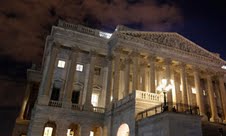Budget Politics: A Fiscal Gridlock
October 1, 2013
As the clock struck midnight the United States Federal government fell into unfamiliar territory not experienced since 1996. The political climate of the 113th congressional session has perpetuated the same gridlock politics that stalled progress in the debt ceiling debate and caused a credit downgrade.
For the first time in the turn of the century the government did not pass a budget proposal. Seventeen days from now congress was also scheduled to debate on the debt ceiling again. Functionally, the government of the United States has shut down for the time being. The last time this happened it lasted 21 days.
“Government is closed, because of the irrationality of what is going on the other side of the Capitol,” said Senate Majority Leader Harry Reid, D-Nev, on the Senate Floor Tuesday morning.
Congress has one key duty in the Constitution which is to pass spending bills to fund the government with the fiscal year of the 2014 year beginning on Oct. 1. The holdup arose when House Republicans insisted on including provisions to defund or derail “Obamacare”. While the law is not directly tied to funding the government it was used a potential bargaining chip.
Despite the double digit attempts to defund or delay the Affordable Care Act (ACA), President Obama’s landmark domestic achievement remains intact. Nearing the midnight deadline the House voted to reaffirm their previous amendments to derail spending to ACA even though the Democrat controlled Senate stated that this would be a deal breaker.
Reid sent the Senate home for the night after shutting down the House amended spending budget. Reid vowed that he and the Democrats “will not go to conference with a gun to our head,” said Reid.
A political backlash in the election season is becoming a bigger possibility. The end result could potentially harm the Republicans more. A CBS News/New York Times poll reveals that 44 percent of Americans would blame the Republicans for the government shutdown and 16 percent would blame democrats. The same poll indicates that six in 10 Americans think that any agreement on the budget and debt ceiling should be kept separate from discussion on the health care law.
According to analysis by CNN roughly 3.3 million government workers are deemed “essential” and will keep working but more than 800,000 government employees will sit at home. Further analysis from Brian Kessler, economist with Moody’s Analytics indicates that a three to four week shutdown will cost the economy about $55 billion.



